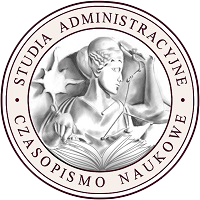






Studia Administracyjne (formerly Zeszyty Naukowe Uniwersytetu Szczecińskiego. Studia Administracyjne) is a peer-reviewed open-access journal published at the Faculty of Law and Administration of the University of Szczecin by the University of Szczecin Press. There are two issues per year.
Studia Administracyjne is a multidisciplinary journal. Its main profile accommodates primarily administrative law, but given its links with other legal fields, Studia Administracyjne also publishes articles that focus on environmental law, constitutional law, civil law, financial law, public economic law or local government law. The dynamic legislative development and amendments in these fields also links them with the law of the European Union. Therefore, an exchange of thought and views is so significant and very much needed. Studia Administracyjne provides a platform for local researchers in national, EU and international law.
It also contributes to greater integration of the legal circles being a source of inspiration for legal scholars and commentators, representatives of law applying authorities, practising lawyers and the academic community.
Submissions in Polish or English are accepted on a continuous basis.
Manuscripts must be sent in through the journals platform.
Log in or register to submit a manuscript.
The editorial team uses a plagiarism checker plagiat.pl to check originality of submitted manuscripts (https://plagiat.pl).
Studia Administracyjne was awarded 20 points in the Communication from the Minister for Education and Science of 5 January 2024 on the list of scholarly journals and peer-reviewed international conference proceedings.

Improving the academic level and internationalization of the journal Studia Administracyjne - project financed under agreement 638/P-DUN/2019 from the funds of the Minister of Science and Higher Education allocated for activity popularising science.
Studia Administracyjne is published in paper and electronic form in Polish or English. The electronic version is the original version. The journal is available through open access. Full versions of articles published in the journal are available at https://wnus.edu.pl/sa without a grace period or any technological barriers. Articles are published under the CC-BY-SA licence.
The journal is indexed in following bases:
Arianta — Polish Scientific and Professional Electronic Journals - http://www.arianta.pl/
BazHum — https://bazhum.pl/
Biblioteka Nauki ICM — https://bibliotekanauki.pl/
CEEOL — Central and Eastern Europe Online Library — http://www.ceeol.com/
CEJSH — Central European Journal of Social Sciences and Humanities - http://cejsh.icm.edu.pl/cejsh/
DOAJ — Directory of Open Access Journals - https://doaj.org/
EBSCO — https://www.ebsco.com/products/research-databases/legal-source
ERIH+ — The European Reference Index for the Humanities and the Social Sciences - https://dbh.nsd.uib.no/publiseringskanaler/erihplus/index
GoogleScholar — https://scholar.google.pl/
IndexCopernicus — https://journals.indexcopernicus.com/
MIAR — https://miar.ub.edu/
Most Wiedzy (Bridge of Knowledge) — https://mostwiedzy.pl/pl/magazine/catalog
PBN — Polska Bibliografia Naukowa - https://pbn.nauka.gov.pl/
Polona — https://polona.pl/
Sherpa Romeo — https://v2.sherpa.ac.uk/id/publication/41140
All scholars are welcome to work with us and co-create our journal.
Abstracts of published articles are available on-line in the international database of The Central European Journal of Social Sciences and Humanities https://cejsh.icm.edu.pl
Full versions of articles are available in the database of the Central and Eastern European Online Library (CEEOL) www.ceeol.com
The publishing activity of Studia Administracyjne is financed by the University of Szczecin and the journal does not charge fees for publishing papers. All published articles are available free of charge and without any technical restrictions on-line on the journal’s website administered by the University of Szczecin Press (WNUS).
All articles are published under the CC-BY-SA licence.
No marketing media are used by Studia Administracyjne and all forms of direct marketing are suitably oriented, not aggressive and primarily focused on disseminating scholarly content published in the journal.
Full versions of articles published in the journal are available at wnus.edu.pl/sa without a grace period or any technological restrictions.
All articles are published under the CC-BY-SA licence and the editorial team does not charge any fees for publications (APC).